RBS's Blocked Banker Bonus Plan Will Hurt the Taxpayer, says Standard Life

One of Standard Life's most senior executives has slammed the government for blocking the Royal Bank of Scotland's bid to boost banker bonuses to 200% of salaries, claiming that it will hurt the taxpayer.
According to the fund manager's global head of equities, David Cumming, UK Financial Investments' decision to stop RBS paying a 2:1 variable-to-fixed pay ratio, will only damage the bank's ability to perform now and later, when it becomes privatised.
"It weakens its performance, reduces the value of the bank and consequently the amount of money taxpayers receive when the government eventually reduces their stake, i.e. it will hurt taxpayers," said Cumming.
"It was politically expedient but it's going to damage the bank and damage the taxpayers, so we would not have been in support of that measure."
In April, RBS cancelled its fight - for now - to boost bonuses to twice the value of executive salaries, after UKFI, revealed it would block such a move.
RBS said in its Annual Remuneration Report that UKFI is opposed to a 2:1 variable-to-fixed pay ratio, and therefore it would not propose the bonus structure at its next Annual General Meeting.
"The board acknowledges that this outcome creates a commercial and prudential risk, which it must try to mitigate within the framework of a 1:1 fixed-to-variable compensation ratio," said RBS in the report.
In February, RBS granted staff £576m (€700m, $967) in bonuses for 2013 despite the lender losing £8.2bn over the past year.
"I know it's a highly emotional issue... but I need to pay these people fairly in the market place to do the job," said Ross McEwan, CEO at RBS.
RBS is 81% owned by the government and its largest investor is the UKFI with a 63.9% holding. It has to get permission from the government for any remuneration or dividend related proposals.
"HM Treasury (or UK Financial Investments Limited (UKFI) on its behalf) may be able to exercise a significant degree of influence over the Group and any proposed offer or sale of its interests may affect the price of securities issued by the Group," said RBS in the report.
© Copyright IBTimes 2025. All rights reserved.






















